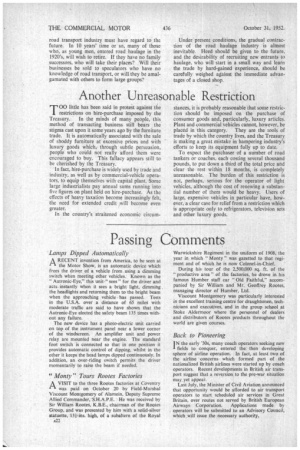Another Unreasonable Restriction
Page 24

If you've noticed an error in this article please click here to report it so we can fix it.
T00 little has been said in protest against the restrictions on hire-purchase imposed by the Treasury. In the minds of many people, this method of transacting business still bears the stigma cast upon it some years ago by the furniture trade. It is automatically associated with the sale of shoddy furniture at excessive prices and with luxury goods which,through subtle persuasion, people who could not really afford them were encouraged to buy. This fallacy appears still to be cherished by the Treasury.
In fact, hire-purchase is widely used by trade and industry, as well as by commercial-vehicle operators, to equip themselves with capital plant. Some large industrialists pay annual sums running into five figures on plant held on hire-purchase. As the effects of heavy taxation become increasingly felt, the need for extended credit will become even greater.
In the country's straitened economic circum
stances, it is probably reasonable that some restriction should be imposed on the purchase of consumer goods and, particularly, luxury articles. Plant and commercial vehicles cannot, however, be placed in this category. They are the tools of trade by which the country lives, and the Treasury is making a great mistake in hampering industry's efforts to keep its equipment fully up to date.
To expect the purchaser of a number of road tankers or coaches, each costing several thousand pounds, to put down a third of the total price and clear the rest within 18 months, is completely unreasonable. The burden of this restriction is not, perhaps, serious for the operator of light vehicles, although the cost of renewing a substantial number of them would be heavy. Users of large, expensive vehicles in particular have, ho'ever, a clear case for relief from a restriction which is appropriate only to refrigerators, television sets and other luxury goods.












































































